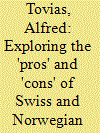| Srl | Item |
| 1 |
ID:
097270


|
|
|
|
|
| Publication |
2010.
|
| Summary/Abstract |
Parliamentarization is an under-studied dimension of Euro-Mediterranean relations. A preliminary assessment of the Euro-Mediterranean Parliamentary Assembly shows that the parliamentary process is not unique to the Mediterranean. The origins, aims, and objectives of the EMPA are presented, as are its structure and functions during its first four years of existence. Despite many weaknesses and limitations, the EMPA can play an important role in Euro-Mediterranean relations, but in order for it to do so, both its structures and functions need to be strengthened.
|
|
|
|
|
|
|
|
|
|
|
|
|
|
|
|
| 2 |
ID:
071603


|
|
|
|
|
| Publication |
2006.
|
| Summary/Abstract |
A theoretical appraisal of the Swiss and Norwegian models of relations with the European Union (EU), as well as an empirical assessment of experience accumulated, shows that the European Economic Area (EEA) model is quite constraining. Both models have semi-colonial features. In the EEA model, the non-EU member has a little more influence on decision-making but is less independent of the EU than with the Swiss approach. The latter is time-consuming and is subject to much give and take. In the long run, however, countries expected to benefit from the new European Neighbourhood Policy, such as Israel, might find that an EEA approach is not acceptable if it does not offer membership as a long-term possibility, because it is undemocratic. Finally, in the eventuality of a trade war between the United States and the EU, a scenario of high relevance for Israel, the Swiss model would give it more freedom of manoeuvre than the EEA model. Israel would not be part of the EU trading bloc in the eyes of the United States.This is much less clear in the event of EEA membership. On the other hand, an in-depth examination of the Swiss model shows that the 'à la carte' approach does not allow for any degree of depoliticization in relations with the EU, as Israel was hoping for.
|
|
|
|
|
|
|
|
|
|
|
|
|
|
|
|